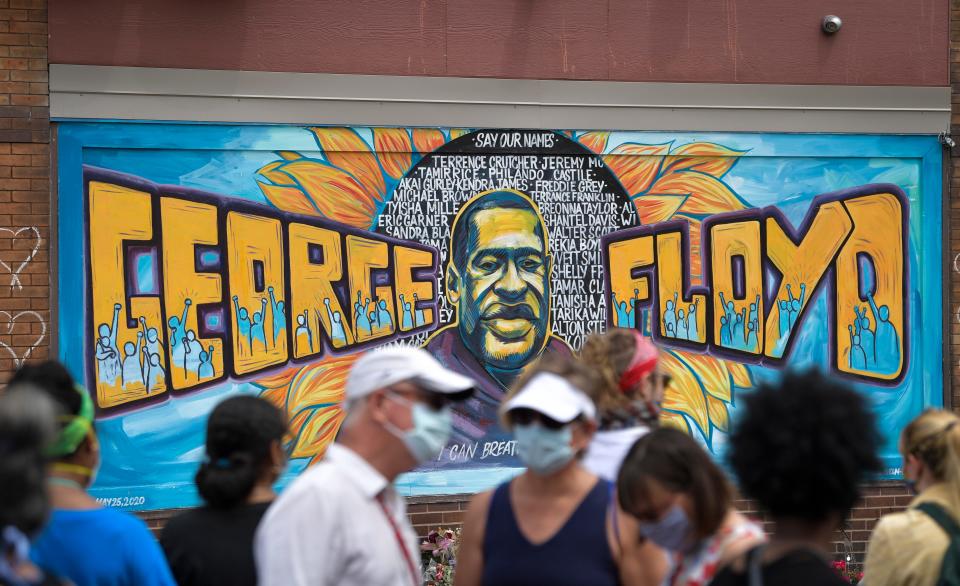No, George Floyd court documents don't prove he died of drug overdose | Fact check
- Oops!Something went wrong.Please try again later.
The claim: Court documents prove George Floyd died of a drug overdose
An Oct. 26 Facebook video (direct link, archive link) shows a clip from a podcast hosted by Valuetainment founder Patrick Bet-David discussing court documents related to George Floyd's death.
"Home Team discusses the shocking news about George Floyd, indicating that he died from a drug overdose," reads the video's caption.
The caption also includes a quote that reads, "There were no medical indications of asphyxia or strangulation."
The video was shared more than 3,000 times in five days.
Follow us on Facebook! Like our page to get updates throughout the day on our latest debunks
Our rating: False
The claim misrepresents a deposition that describes a conversation between a prosecutor and the medical examiner who performed George Floyd's autopsy. The medical examiner's autopsy report and his testimony at trial indicate Floyd died as a result of "cardiopulmonary arrest" complicated by "restraint and neck compression." The court documents in question never attribute Floyd's death to a drug overdose.
Floyd died of 'cardiopulmonary arrest' while restrained by police
George Floyd, a 46-year-old Black man, died May 25, 2020, after then-Minneapolis police officer Derek Chauvin, who is white, was caught on video kneeling on Floyd's neck for more than nine minutes, sparking racial justice protests around the world.
After a lengthy jury trial, Chauvin was convicted of murder and manslaughter in connection with Floyd's death. He was sentenced to 22 1/2 years in prison. In a separate case, Chauvin later pleaded guilty and was sentenced to 21 years in federal prison for violating Floyd's civil rights. Those two sentences are being served concurrently.
While the court document referenced in the Facebook video does exist, it doesn't exonerate Chauvin or say Floyd "died from a drug overdose," as the video claims.
Fact check: Video shows protesters invited into DC home in 2020, not 'rioters' in 2023
The document in question is a transcript of a deposition given by Hennepin County prosecutor Amy Sweasy Tamburino. She filed a lawsuit last year claiming then-Hennepin County Attorney Mike Freeman retaliated against her for a previously settled sex discrimination claim, according to KSTP, a local television news outlet. Her deposition took place Aug. 21, 2023.
Minneapolis, where Floyd was killed, is the Hennepin County seat.
Sweasy, during her deposition, described a conversation she said she had with Andrew Baker, the county's medical examiner, the day after Floyd was killed. Sweasy recalled Baker told her he found no injuries to the "vital structures of Mr. Floyd's neck" and no signs of "asphyxia or strangulation."
"He said to me, 'Amy, what happens when the actual evidence doesn't match up with the public narrative that everyone's already decided on?'" the transcript says. "And then he said, 'This is the kind of case that ends careers.'"

This was a preliminary discussion, not a finding after a full autopsy. And the discussion didn't reference drugs as a cause.
Baker performed Floyd's autopsy on May 26, 2020, and concluded he died of "cardiopulmonary arrest complicating law enforcement subdual, restraint and neck compression."
The same report shows Floyd had 11 nanograms per milliliter of fentanyl in his blood. But medical experts called as witnesses at Chauvin's trial testified that amount was not enough to be considered fatal, as USA TODAY previously reported.
Baker also testified about Floyd's cause of death during Chauvin's trial, repeating the conclusion he reached in his report that Floyd died because "he experienced a cardiopulmonary arrest in the context of law enforcement subdual, restraint and neck compression."
"It was the stress of that interaction that tipped him over the edge given his underlying heart disease and his toxicological status," he said.
Fact check: Video shows Brazilian soccer fans, not pro-Palestine protesters in France
While it's true Baker's autopsy report did not find "life-threatening" injuries to Floyd's neck, it did note blunt-force injuries to his face, shoulders, hands, arms and legs, as well as a broken rib and bruises on the wrists.
A separate autopsy commissioned by Floyd's family determined "asphyxiation from sustained pressure" was the cause of his death, and it found "neck and back compression" caused a "lack of blood flow to the brain."
Multiple independent experts told the Associated Press that Floyd's medical problems weren't enough to "change the conclusion that (Floyd's) death was a homicide."
USA TODAY reached out to Bet-David for comment but did not immediately receive a response.
Our fact-check sources:
USA TODAY, April 20, 2021, Derek Chauvin found guilty on all counts in the murder of George Floyd
USA TODAY, June 25, 2021, Derek Chauvin sentenced to 22 1/2 years in prison for the murder of George Floyd
USA TODAY, April 21, 2021, Fact check: George Floyd's death ruled a homicide, not fentanyl overdose
USA TODAY, June 1, 2020, Medical examiner and family-commissioned autopsy agree: George Floyd's death was a homicide
Associated Press, July 7, 2022, Ex-Minneapolis cop Derek Chauvin gets 21-year federal sentence for violating George Floyd's civil rights
Associated Press, June 4, 2020, Experts: Floyd’s health issues don’t affect homicide ruling
Hennepin County District Court, Aug. 21, Videotaped deposition of Amy Sweasy Tamburino
KSTP, Nov. 3, 2022, Months after settlement, Hennepin County Attorney accused of retaliation again
KSTP, May 20, 2022, Hennepin Co. Attorney’s Office reaches $190K settlement on discrimination charges
Hennepin County Medical Examiner, May 26, 2020, Autopsy report
C-SPAN, April 10, 2021, Andrew Baker Testimony
Thank you for supporting our journalism. You can subscribe to our print edition, ad-free app or e-newspaperhere.
Our fact-check work is supported in part by a grant from Facebook.
This article originally appeared on USA TODAY: George Floyd was murdered, did not die of drug overdose | Fact check

